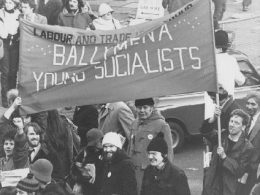The big winners at the next General Election are likely to be the Labour Party, benefitting from the anger of voters at Fianna Fail and the desire for change.
Although the Labour Party haven’t been in Government for more than 13 years now, they do not really constitute something “new”. In fact, Labour is the oldest political party in the state and has actually been in government on five separate occasions in the last 40 years (with Fine Gael from 1973-7, 1981-2 and 1982-7, with FG and Democratic Left 1994-7 and with Fianna Fail 1992-4).
In each and every one of these governments the party, having benefitted from a mood for radical change on the part of Labour voters, were prepared to attack the interests of ordinary working class people in order to stay in power, facilitate co-operation with their coalition partners and run the capitalist system.
• Unemployment: When Labour went into Government with Fine Gael in 1982 11.4% of the workforce were unemployed. By the time that Government collapsed in 1987, 16.8% of the workforce were unemployed. Workers who occupied their workplaces rather than accept redundancy were jailed at Ranks and Moracrete in Dublin and forced to go on hunger strike to save their jobs at Clondalkin Paper Mills. Labour in Government have actually shut down state industry and thrown workers on the dole as at Irish Steel in the 1990s.
• Taxes: Labour voted for VAT to be applied to children’s shoes in 1981. As Minister for the Environment in 1983 Labour leader Dick Spring cut the rate support grant to councils and introduced legislation which allowed councils to bring in water and bin charges. Hundreds of ordinary householders campaigning against water charges in Dublin in the 1990s were dragged in front of the courts for non-payment of the unjust tax under a FG/Lab/DL government. Meanwhile, in Government with Fianna Fail in 1993 Labour voted for a tax amnesty which let wealthy tax dodgers off the hook.
• Cutbacks: The vicious health cuts of the late 1980s, from which the health service today has still not fully recovered, were actually begun under the Fine Gael/Labour government of 1982-7 under Labour Party Minister for Health Barry Desmond. Subsidies for milk, bread and butter – a vital safeguard for low income families against outright poverty – were abolished by that government.
• Attacks on the public sector. The 1982-7 coalition blocked increases due to teachers and refused to appoint an arbitrator to deal with public sector pay claims, implementing a pay freeze by stealth.
Often, Labour entered government at a time of crisis, with a “mess” left behind by Fianna Fail. However, instead of using a crisis in capitalism to promote radical change Labour consistently used the crises as an excuse to postpone radical change. There is no solid reason to believe that it will be any different this time.
There are, however, two important differences between Labour going into government in the near future and Labour going into government in the past.
Firstly, capitalism’s crisis is deeper now than in the 70s, 80s or 90s. The system will demand even more savage assaults on the living standards of working class people from its government.
Secondly, Labour ministers in previous governments had to look over their shoulders at an active and angry left-wing membership who put them under real pressure on the issues. The expulsion of the Marxist left in the late 1980s and the Blairification of the Labour Party in the 1990s has removed that pressure point and will give Labour ministers a freer hand to support an anti-working class agenda now.
For all these reasons and more, workers and young people who want to vote for a real alternative at the next election should look beyond Labour and vote for Socialist Party or other genuine left-wing candidates.











